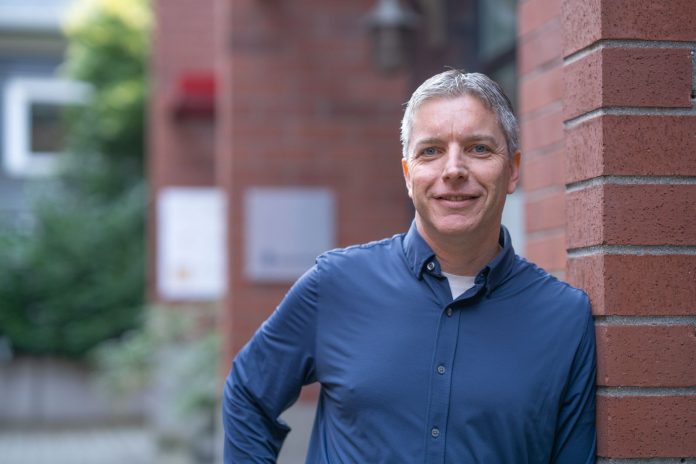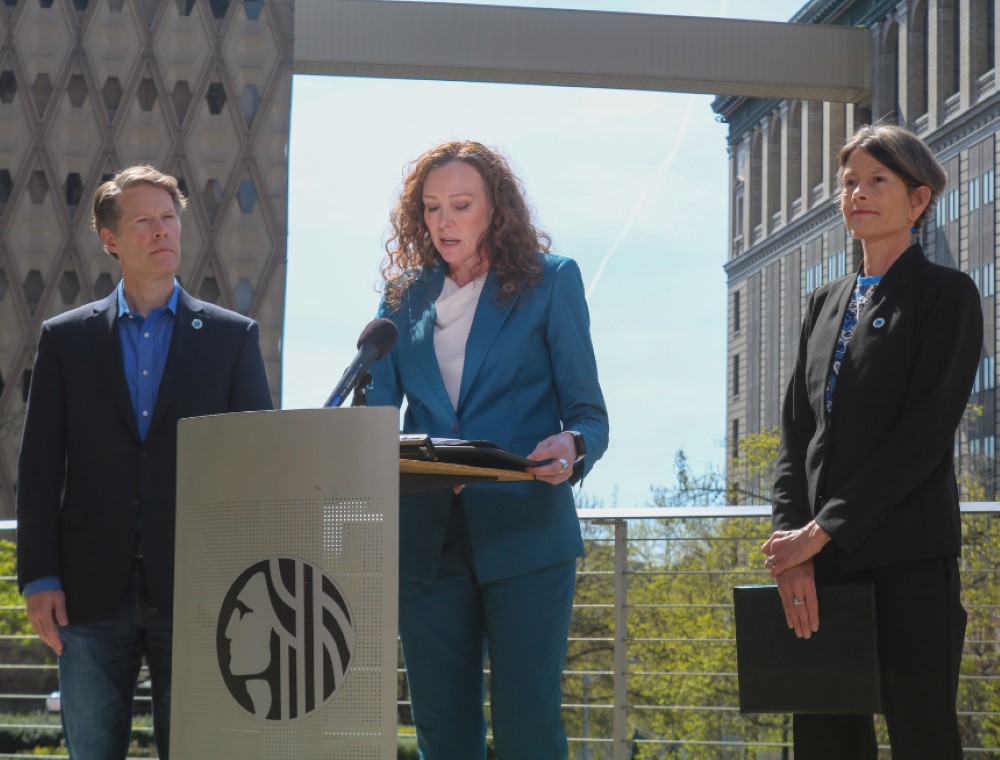
Legal aid attorney Rory O’Sullivan announced his candidacy for Seattle City Attorney earlier this month, in what bodes to be an exciting local race in 2025. O’Sullivan said he decided to run after watching the policies coming out of the current City Attorney’s Office.
“There’s just a lot of things I’d do differently,” O’Sullivan said, noting the positive impact in the community having a more capable and compassionate city attorney could have.
The Seattle City Attorney position is currently held by Republican Ann Davison, who beat her Democratic opponent Nicole Thomas Kennedy in 2021 by nearly four points, or 10,000 votes. Davison has cultivated a tough-on-crime brand and a demeanor that critics see as brash and tilted toward punishing political enemies.
Davison has launched the High Utilizers Initiative, championing the new Stay Out of Drug Area (SODA) and Stay Out of Area of Prostitution (SOAP) zones, and trying (and failing) to prosecute a protestor who was helping an RV owner during a city homeless sweep. She also unilaterally ended Seattle Municipal Court’s (SMC) community court.
O’Sullivan wants to take a different approach. He’d have a different set of enforcement priorities than Davison, wanting to more quickly prosecute driving under the influence and domestic violence cases. More broadly he’s interested in fostering a system that helps people disengage from the criminal legal system by using therapeutic courts, diversion, restorative justice, and matching people with the services they need.
O’Sullivan expressed concern that Davison is not stepping up to the task of defending Seattle from the next Donald Trump presidency, citing a Seattle Times article for which she declined to be interviewed and gave a non-substantive statement saying she wants to continue focusing on the City’s public safety challenges.
In contrast, during Trump’s first term, then-City Attorney Pete Holmes sued Trump after he gave an order targeting sanctuary cities.
“I think the city absolutely needs to be prepping for the potential for lawsuits for funding restrictions from the federal government, challenging those funding restrictions,” O’Sullivan said. “This is absolutely something that the city attorney’s office is going to need to engage in, and it’s frightening that our current city attorney does not seem up to the task.”

While Davison was active in the “Walk Away” movement seeking to win Democrats over to Trump, O’Sullivan has been active in Democratic politics and progressive causes for decades. He was chair of the 37th District Democrats in 2016 when he finished runner-up in the County Council’s appointment process to fill the state senate seat vacated by Pramila Jayapal’s election to Congress that November. The county council chose Rebecca Saldaña instead.
While thus far O’Sullivan is the only candidate to file a run against Davison, former Councilmember Andrew Lewis is rumored to be mulling a run. Before he was elected to council in 2019, Lewis was an assistant city attorney under Pete Holmes.
There may also be other entrants into the race.
O’Sullivan’s previous experience
O’Sullivan is no stranger to public service, In 2003, he helped found Washington Public Campaigns, an organization that originally worked to overturn the state law prohibiting using public funds for elections. In 2013 he was the chair of the campaign for a Seattle public funding measure that narrowly failed at the polls.
A few years later, he was one of the people who wrote the language for what became Seattle’s democracy voucher program, the first of its type in the nation.
“We want to make sure that folks who have a lot of community support can put together campaigns and run, and we want more participation from the community,” O’Sullivan said. “What we’ve seen– there’s been some recent academic research on this–we have more participation, both in terms of giving democracy vouchers and in terms of voting from traditionally marginalized communities.”
O’Sullivan is now participating in the democracy voucher program as a candidate and seeking to qualify to unlock his vouchers.
Seattle’s democracy voucher program is due to be renewed in 2025 in order to extend beyond the next election cycle, and some have worried more conservative leaning politicians like Davison and Seattle City Council President Sara Nelson are not interested in extending it. Nelson did not use the voucher program during her 2021 run, instead relying on high-dollar donors and political action committees to vastly outspend her opponent.
He has also worked to support ranked choice voting, serving on the board of FairVote Washington, and served on Seattle’s redistricting committee in 2021 and 2022.
His law career is equally storied. He’s argued cases in front of the 9th Circuit Court of Appeals and the Washington State Supreme Court. He’s taught law at Seattle University and the University of Washington. As an attorney at the Northwest Justice Project, he’s represented homeowners facing foreclosure;, as managing attorney at the Housing Justice Project, he provided free legal assistance to renters facing eviction, and he later served as an administrative law judge to help process a backlog of unemployment cases at the height of the Covid-19 pandemic.
A few years ago, informed by his experiences as a judge and seeing how many people were appearing without representation, he opened his own firm, called Washington Employment Benefits Advocates, to focus on representing workers seeking unemployment insurance benefits.
“My career has really been focused on the needs of the community,” O’Sullivan said.
Taking on the police union
O’Sullivan has come out as a strong proponent for police accountability. He sees one of the main roles for the City Attorney as limiting the City’s liability in lawsuits, and for him, a big piece of that is ensuring that proper police accountability measures are in place.
“What that means is in the negotiation process with the police officers guild, actually negotiating in a contract that enacts the accountability measures that everybody claims to support,” O’Sullivan said.
The last Seattle Police Officers Guild (SPOG) contract, approved this spring, gave Seattle Police Department officers 24% raises while making little progress aligning with the City’s 2017 accountability ordinance.
O’Sullivan sees the new contract as creating additional liability for the City. “When we’re not enacting accountability measures that the voters have said that they want, it puts the City at risk of future massive judgments like the ones that we’ve been having,” he said.
O’Sullivan looks forward to providing legal advice during the ongoing negotiations with SPOG, and he’s also willing to speak out before the final City Council vote if he thinks the contract in question isn’t what’s good for voters.
“I’ve just been disappointed in the failure of people to call that out,” he said.
He’s also willing to consider taking a SPOG contract to interest arbitration, a strategy about which there has been much speculation. Senior Deputy Mayor Tim Burgess, for example, recently told The Urbanist he thinks the odds of a good outcome from interest arbitration are only 50/50.
But O’Sullivan thinks it’s a gambit worth taking.
“If the police officers guild is not consenting to these reforms that are present in many other places, then yes, we should absolutely go to arbitration,” he said. “If the police officers guild knows that the negotiators on the other side of the table are not willing to go to arbitration, why would they consent to anything which they don’t want? We need elected officials who are going to go into those negotiations demanding what the voters have asked.”
Diversion and how to pay for it
O’Sullivan is interested in doing whatever possible to build out the Community Assisted Response & Engagement (CARE) team and other alternative responses. And he understands that allowing the CARE team the leeway to operate like other alternative response programs across the country also involves SPOG.

“Everybody has been saying we don’t think every 911 call should be responded to by somebody with a badge and a gun, right?” O’Sullivan said. “And yet, that MOU [memorandum of understanding] that has been negotiated with police officers could prevent our care team from responding to a bunch of calls that they can and should be responding to.”
He’d also like to build out the Let Everyone Advance with Dignity (LEAD) diversionary program. He believes building out these responses would free up officers to respond to the matters for which they are best suited while allowing mental health professionals to handle other cases for which they are better trained.
“It’s only when [diversion is] really not appropriate, when the public safety is really at risk, that you funnel somebody into the criminal legal system,” O’Sullivan said. “And at that point, the preference would be for a therapeutic court where you’re actually understanding the needs of the individual, what’s led them to this interaction with the criminal legal system, and what services they need to get out.”
When asked how the City would pay for these services, O’Sullivan said he is eager to get to work helping the City craft progressive revenue options that will be able to withstand legal challenges and then defend those challenges as necessary. He brought up his involvement in filing amicus briefs on behalf of the City and consulting with the City Attorney’s office when the democracy vouchers program was challenged. “This is something that I care about,” O’Sullivan said.
Criticism of the current City Attorney
O’Sullivan didn’t pull his punches when speaking about current City Attorney Davison and her policies.
He completely disagrees with her office’s policy to file an affidavit of prejudice against sitting Seattle Municipal Court Judge Pooja Vaddadi in all criminal cases going forward.
“Doing a blanket affidavit of one of seven elected judges I think is completely inappropriate, and if the City Attorney’s Office had problems or questions or concerns with Judge Vaddadi, they had a lot of opportunities to open a dialogue with the Municipal Court to register their concerns or to appeal her decisions,” O’Sullivan said. “It’s just another example of how this city attorney has managed to alienate all the different organizations that this city attorney’s office needs to work with.”
O’Sullivan argued the new SODA and SOAP exclusion zones are “window dressing” rather than good policy that would work over the long run.
“It’s an opportunity for the City Attorney’s Office and the City Council to look like they’re doing something without actually improving the experience of people in the city,” O’Sullivan said.
O’Sullivan talked about how other cities have addressed problems of open air drug markets by engaging in a deep and extended on-the-ground effort that includes getting to know all the people involved and impacted, getting the community involved, and offering better opportunities to people. He said this kind of long-term approach leads to a lasting impact on improving the environment.
“The problem is that our current city council, our current office, is not willing to engage in that kind of deep, lasting work that requires consistent, long-term engagement,” O’Sullivan said.
He said he’s heard that the Office of Labor Standards has been refraining from referring cases to the current City Attorney because they’re concerned they won’t be litigated properly. He promises to “be much more bold about prosecuting employers that are stealing wages from their employees.”
O’Sullivan said he wants to do a better job protecting tenants.
“There’s a lot of really good tenant protections that previous councils have enacted that the city attorney has an opportunity to ensure are enforced properly,” O’Sullivan said.
He is critical of Davison’s High Utilizer Initiative, calling out that it does nothing to disrupt the cycle of people moving in and out of jail. Instead, he favors something similar to what the King County Prosecuting Attorney’s Office does in offering people caught in the system more services to help break the cycle.
He also differs from Davison when it comes to the local jails. He spoke about the staffing issues at the King County Jail and pointed out that better jail models exist, pointing out the Department of Corrections has been sending teams to Europe to learn how jail facilities can operate more effectively and humanely. He thinks as the City Attorney, he can play a role in negotiating a jail contract that prioritizes inmate services while working with the King County Council and Executive, King County Public Health, and King County Prosecuting Attorney Leesa Manion to improve the situation.
“Davison’s priority has been eliminating booking restrictions, making sure there’s a number of beds,” O’Sullivan said. “My priorities would be for the inmates that are there, ensuring they’re receiving the services they need and ensuring that the jail itself is doing the kind of work to create a culture that’s a place where people do want to work, that is a more humane place that has fewer inmate deaths. It’s just horrendous.”

Meanwhile, Seattle has negotiated a new contract with the Score Correctional Entity (SCORE) in Des Moines, a facility with which O’Sullivan said he’s had difficulties serving as a practicing attorney.
“It’s horribly run,” O’Sullivan said, “and they get away with it because there’s no one entity that is really keeping tabs on it and ensuring that it’s operating correctly.”
He says as City Attorney, he’d avoid using SCORE as much as possible.
With his emphasis on getting people the help they need to exit the criminal legal system and fighting for workers’ and tenants’ rights and police accountability, O’Sullivan is offering a very different vision of how the City Attorney’s office could operate going forward.
Visit O’Sullivan’s campaign website for more information.
Amy Sundberg is the publisher of Notes from the Emerald City, a weekly newsletter on Seattle politics and policy with a particular focus on public safety, police accountability, and the criminal legal system. She also writes science fiction, fantasy, and horror novels. She is particularly fond of Seattle’s parks, where she can often be found walking her little dog.

